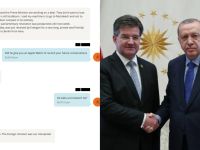By Eleanor Beevor
Chances are that if you have been following the Syrian conflict in the international press, you will have come across mentions of the Syrian Observatory for Human Rights (SOHR).
The SOHR is a documenting body, which is collecting data from a network of informants about human rights violations across the conflict. And it has become a go-to source for fresh stories on Syria by practically every major media outlet.
But not everyone is convinced that the SOHR deserves the prominence it gets. And this has become an especially fraught question in Britain over the last few weeks. That is because it was recently revealed that the UK Foreign and Commonwealth Office (FCO) funded the SOHR for a time.
Funded by the Foreign Office
A Foreign Office spokesperson told Al Bawaba:
“The UK is committed to achieving a political settlement for Syria that ends the war and suffering, and provides stability for all Syrians and the wider region. This includes support to documenting human rights abuses in Syria. In 2012, the UK funded a project worth £194,769.60 ( $225,978) to provide the Syrian Observatory for Human Rights (SOHR) with communications equipment and cameras.”
However, SOHR’s critics interpret the UK government’s funding as at best misplaced, and more often as highly suspicious.
And yet, as across all discussion on Syria, criticism tends to be selectively applied. There are problems with the SOHR, but they are far from unique to that organization. And so the controversy around the UK government’s funding of it is yet another window into the bitter struggle over information in the Syrian conflict.
(AFP File Photo)
The critics of SOHR tend to have two main points. The first is around the accuracy of its data. The SOHR did not respond to a request for comment, but it is well-known that the organisation operates on a shoestring. Its founder, Rami Abdulrahman (born Ossama Suleiman) runs the SOHR out of his semi-detached house in the British city of Coventry.
In his home he works more or less alone, but according to the New York Times, he collects information on atrocities in Syria from a network of “more than 230 activists.” The SOHR states that it has a vetting process for checking information, although there is little detail as to what that entails.
Rami Abdulrahman (AFP File Photo)
Basileus Zeno, a Syrian political scientist at the University of Massachusetts, Amherst, who studies the dynamics of conflict, told Al Bawaba:
“Based on my observations and my interviews with civilians and activists inside Syria over the last few years, I found the SOHR as a necessary but not sufficient source of information. This is because while it does document violations against human rights by all parties, its methods of collecting, verifying, and validating the data is vague, and lacks rigorousness and transparency. Moreover, the SOHR showed inconsistency between the Arabic and English versions of its reports when it documented the death toll and causalities in the same incident.”
But what most angers the SOHR’s critics is the organisation’s ambiguous claim to “neutrality”. The SOHR is well aware that trust is a scarce resource in reporting on Syria. Thus any future use of its data, for instance in war crimes trials, will be affected by a perception of bias.
Yet SOHR founder Rami Abdulrahman has also made statements to the press which make clear he is no supporter of the Assad regime. He told Reuters: “I came to Britain the day Hafez al-Assad died, and I’ll return when Bashar al-Assad goes.”
And the SOHR’s network of activists is, according to the New York Times, founded on Abdulrahman’s connections from his own days as a Syrian political activist prior to the conflict. The SOHR was actually set up in 2006, several years before the start of the conflict. Presumably the documentation of the Assad regime’s human rights violations was their priority.
Raqqa, Syria, October 20, 2017 (AFP, File Photo)
But if there is a bias against Assad in the SOHR, they still have proven themselves willing to document human rights abuses by other parties to the conflict. As Abdulrahman himself has pointed out, the SOHR has gathered angry critics on all sides. That is not proof of neutrality in itself. However, a better question is whether neutrality in the documentation of conflicts can ever exist. Basileus Zeno said:
Documenting violations
“Over the last seven years the SOHR did document violations committed by all parties, including violations by the armed Syrian opposition, which led to several smear campaigns against Rami Abdulrahman and the SOHR in general. For many activists who romanticized the revolution, the SOHR was a suspicious and an unreliable source that sought to delegitimize the revolution. For the regime supporters, it was a notorious vehicle for Western soft power that fabricated stories to make the case for “humanitarian intervention” and military intervention.”
SOHR Homepage on Twitter
Nevertheless, information in conflict will always come from a political perspective. Zeno continued:
“After the uprising, the Syrian regime and its security apparatus sought to control the narrative and barred most foreign journalists from working in Syria. Consequently, mainstream media and monitoring organizations had to rely on activists and “eyewitnesses” on the ground. These sources; however, are not independent even when they claimed otherwise, and most of the time they have to maneuver or even coordinated with armed groups. They have agency and they interpret the conflict in a very political way by labeling, for instance, certain victims as “martyrs” and others as “victims” or by ignoring violations when they were committed by armed groups who shared their own stance (especially during the period between 2011-2013), or by shifting the responsibility from one group to another.”
Sense of bias
But this sense of bias feeds critics’ main objection to the Foreign Office’s funding of the SOHR. They believe that by funding a body which they see as overly biased against Assad, the FCO is enabling a case for western intervention and regime change in Syria.
And back in 2012-2013, that might indeed have been a serious cause for concern. According to their above statement, the FCO funded the SOHR in the year 2012, around the same time when British and American military intervention in Syria looked like a serious possibility.
(AFP File Photo)
But that was then, back when Russia was far less involved in the conflict, and there was at least a semblance of a cohesive Syrian opposition. And this is now, where a drawn out intervention by western powers would carry a tremendous risk of sparking conflict with Russia. Any present ambitions of regime change are hampered by a lack of an obvious successor, and by the increasingly likely victory of the Assad presidency in the war.
It is perfectly true that western nations are still involved in Syria, and are trying to leverage the situation to their advantage. But there is no doubt that the likelihood of a regime-change intervention has substantially decreased. Indeed, the Foreign Office is no longer funding the SOHR, according to their statement. And yet efforts continue to try and delegitimise criticism of the Assad regime, including the work of the SOHR, as clandestine western imperialism.
Destruction in the Yarmouk Camp, southern Damascus (AFP File Photo)
One can justifiably be concerned about foreign intentions in Syria, and the “soft power” means they might use to achieve them. The SOHR may indeed have been part of that vision at one time. Its data no doubt has flaws, and if it wishes to regain public trust, the SOHR should be much more upfront about its methods and its limitations.
That said, imperfect data can still be useful if it is treated with appropriate scepticism. Whether the organisation can be called neutral is deeply questionable, (although one could extend such a criticism to any source of information in conflict).
Conspiratorial narrative
But this conspiratorial narrative, which would make western lackeys out of all Syrian voices that speak out against Assad’s crimes, is deeply troubling. It not only flies in the face of extensive, incontrovertible evidence of the Assad regime’s crimes against humanity. It also erodes the agency of hundreds of thousands of Syrians opposing a brutal dictatorship. Basileus Zeno concluded:
“Regardless of the SOHR’s reports and its problematic self-description and funding, the mere documentation of any kind of violations committed by the Syrian regime would make the person an enemy of the state. I still remember how the Syrian state-controlled media and semi-official outlets sought to delegitimize the SOHR, and discredited any report that did not fit with the official narrative about what was going on in Syria after the what was called then the “Arab Spring.” Thousands of peaceful activists, everyday people, and prisoners of conscience were detained, tortured, and/or killed without holding any official accountable.”
A critical eye on bodies of evidence, and its funders, is laudable. But stretching the implications of this criticism, to try and discredit those Syrians who speak out against Assad’s crimes, is a deeply hypocritical riposte to foreign aggression.







